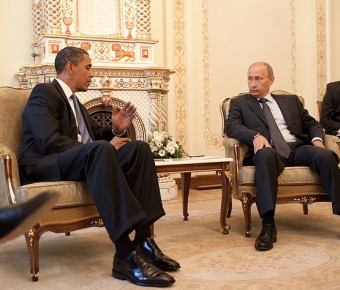Conclusion
In sum, America is entering a period of great dilemma. On the one hand, Washington has to lighten the burden of globally assumed issues in order to focus on domestic problems, which grow steadily. In this, the United States can by no means avoid “delegating” some international issues to other powerful political actors, thereby broadening the latters’ spheres of influence. On the other hand, maintaining its status as the world’s only superpower remains a top imperative of the U.S.’s foreign policy, which becomes harder given the rising power centers of Eurasia. Under these circumstances, strengthening ties (and even alliance) with Moscow appears to be the most rational choice for Washington. Making Russia an ally and actually “granting” her a role of regional coordinator in the post-Soviet space and Eastern Europe will intensify the old acute geopolitical contradictions between Moscow on the one hand and united Europe and China on the other. Intensification of the rivalry between the mentioned power centers may damage Russia’s further economic association with Brussels and Beijing significantly, which otherwise (if backed with Russia’s natural resources) would soon be capable of challenging America’s monopoly in terms of world economic, political and military domination. In addition, what makes Russia an attractive partner/ally for the United States on the Eurasian continent is mainly (1) its historical experience and capabilities of dealing with the regional issues, as well as (2) its economic and technological backwardness in comparison to Europe and China. The latter guarantees that Moscow will not be capable enough in the foreseeable future to threaten the U.S.’s domination on a global scale, while the former assures that it will cope with the role of stabilizing force in the indicated regions perfectly. From Russia’s perspective, Washington’s non-interference in the sphere of Russia’s “traditional” interests is one of the top priorities of Russia’s foreign policy, which Moscow has striven to achieve since the demise of the USSR. Furthermore, alliance with the United States will grant Russia the status of a balancing force, or center of gravity, on the Eurasian continent-something that matches Russia’s geopolitical ambitions completely.
Notes
[1] Andrey Shleifer, Daniel Treisman, Why Moscow Says No, Foreign Affairs, January/February 2011, Stable URL: http://www.foreignaffairs.com/articles/67044/andrei-shleifer-and-daniel-treisman/why-moscow-says-no (accessed November 17, 2011).
[2] This was by all means a critically important point for Moscow, without implementation of which the whole “reset” initiative makes little sense for Russia.
[3] Взгляд в будущее (Foresight), 06.23.2009, Stable URL: http://www.stoletie.ru/ekskliuziv/vzglad_v_budushheje_2009-06-23.htmo (accessed November 17, 2011).
[4] Nikolay Leonov, (01.22.2011), В кольце угроз, Чего Россия должна опасаться в бижайшем будущем (In the circle of threats. What Russia has to fear in the nearest future), Kommunar Press, Stable URL: http://kommunar-press.ru/content/view/1723/55/ (accessed November 17, 2011).
[5] Tatyana Shakleina, (01.22.2011), Россия и США в полицентричном мире (Russia and the U.S. in polycentric world), ПЕРСПЕКТИВЫ, Stable URL: http://www.perspektivy.info/oykumena/amerika/rossija_i_ssha_v_policentrichnom_mire_2011-01-22.htm (accessed on November 14, 2011).
Alexey Fonenko, (09.07.2009), Пределы перезагрузки. Что мешает российско–американскому партнерству? (The limits of the reload. What hinders Russian–American partnership?), Nezavisimaya Gazeta, Stable URL: http://www.ng.ru/politics/2009-09-07/3_kartblansh.html (accessed October 18, 2011).
Alexander Shustov, (10.26.2011) “Арабская весна” в Центральной Азии, (“Arab spring” in Central Asia), Центр Азия, Stable URL: http://www.centrasia.ru/newsA.php?st=1319638800 (accessed November 4, 2011).
[6] Правильный курс стратегии США по отношению к России, (The right course of the U.S. strategy toward Russia) (03.29.2009) POLIT.RU, Stable URL: http://www.polit.ru/article/2009/03/27/usa_russia/ , (accessed October 13, 2011).
[7] Andrey Terekhov, Ростом России хотят управлять из США, (Russia’s growth wanted to be controlled from the U.S.), (05.19.2009), Nezavisimaya Gazeta, Stable URL: http://www.ng.ru/world/2009-05-19/7_usa.html, (accessed November 4, 2011).
[8] Dmitri Trenin, Непрактичный прагматизм, (Unpractical pragmatism), (03.23.2009), POLIT.RU, Stable URL: http://www.polit.ru/article/2009/03/23/trenin/ , (accessed October 1, 2011).
[9] Andrey Shleifer, Daniel Treisman, Why Moscow Says No, Foreign Affairs, January/February 2011, Stable URL: http://www.foreignaffairs.com/articles/67044/andrei-shleifer-and-daniel-treisman/why-moscow-says-no (accessed November 17, 2011).
[10] Ibid.
[11] Ibid.
[12] Tatyana Shakleina, (01.22.2011), Россия и США в полицентричном мире (Russia and the U.S. in polycentric world), ПЕРСПЕКТИВЫ, Stable URL: http://www.perspektivy.info/oykumena/amerika/rossija_i_ssha_v_policentrichnom_mire_2011-01-22.htm (accessed on November 14, 2011).
[13] Jones Bruce, How Do the Rising Powers Rise?, Survival, Vol. 52, No. 6, December 2010/January 2011.
Michael Mendelbaum, The Frugal Superpower, N.Y., 2010.
Andrew J. Bacevich, Limits of Power. The End of American Exceptionalism, N.Y. Holt Paperbacks, 2009
[14] Alexandrov, M. (2007) “Perspectivy uregulirovaniya Gruzino-Abkhazskogo i Gruzino-Osetinskogo konflictov” (The perspectives of Georgian Abkhazian and Georgian-Ossetian conflicts resolution), Caucasus without conflicts and terrorism: dialog of civilizations in Caucasian Crossroads, Yerevan, pp. 112-120.
Skakov, A. (2006) “Rossiya i strani Yuzhnogo Kavkaza: 2004,” (Russia and the South Caucasian states: 2004), The Caucasus Yearbook, Yerevan Caucasus Media Institute, pp. 146-181.
Panarin, I. (2006) “Doktrina Novoy EvroAzii (Ot Parizha do Pekina, ot Mosckvi to Deli I Tegerana)–stabilnost Centralnoy Azii” (The doctrine of New EuroAsia [from Paris to Beijing, from Moscow to Deli and Teheran]–the stability in Central Asia), Mirovoy obshestvenni forum, “Dialog tsivilizaciy” // Vestnik, N° 1/2006, pp 288-296.
[15] Русская Америка, Слабая Россия–это кошмар для США, (Weak Russia is a nightmare for U.S.), Interview with the U.S. Ambassador in Russia John R. Beyrle, (18.10.2011), Stable URL: http://www.therussianamerica.com/web_NEWS/articles/7961/1/ (accessed November 17, 2011).
[16] Sergey Tolstov, Перспективы евразийского интеграционного проекта, (The perspectives of Eurasian integration project), (10.31.2011) Nezavisimaya Gazeta, Stable URL: http://www.ng.ru/courier/2011-10-31/11_perspective.html (accessed November 17, 2011).
[17] Tatyana Shakleina, (01.22.2011), Россия и США в полицентричном мире (Russia and the U.S. in polycentric world), ПЕРСПЕКТИВЫ, Stable URL: http://www.perspektivy.info/oykumena/amerika/rossija_i_ssha_v_policentrichnom_mire_2011-01-22.htm (accessed November 14, 2011).







